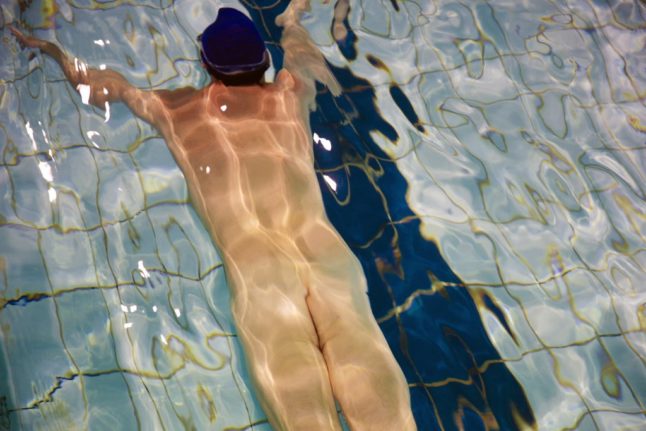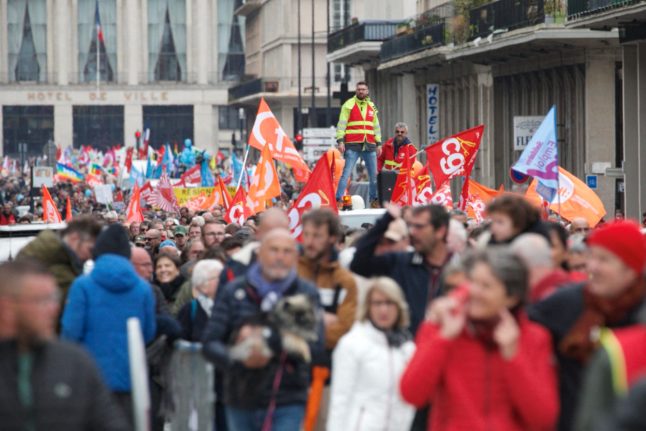It’s not just beaches where you’re likely to find groups of people going au naturel in public in France.
In fact for a brief period Paris even had a nudist restaurant, although that closed after 15 months die to a lack of custom, and in August 2017, Parisian nudists were finally given a spot to take it all off – at a secluded zone in the Bois de Vincennes park east of the city.
And with the places to get naked on the rise in France, it’s a good idea to familiarise yourself with the rules that govern baring all in public.
“The first rule for any naturist is to respect other people,” Jacques Freeman of the Association for the Promotion of Naturism in Liberty (APNEL) tells The Local. “And it’s really important not to be confrontational about your choice to be nude, for example if your neighbours don’t like you sunbathing naked in the garden.”
“There is no law against being naked in public in France – there is a law against disturbing the public order which means you’d probably be arrested if you walked into a church naked, for example,” he says.
“If you’re walking in a forest naked and you come across people who are shocked or surprised by it then you should cover up and, if you have a chance, talk to them about it.”
Freeman also stressed that there can be misunderstandings on both sides of the divide, with some naturists against the fact that you can be clothed in naturist areas, such as beaches.
Naturism, Freeman says, is primarily about allowing people in society to accept each other for their differences, for example religion or skin colour.
Nevertheless, he added that when it comes to getting naked in France, there are some rules you will want to follow to avoid being yelled at by beachgoers.
Here’s our list of what you need to know before getting naked in France.
Going topless
Even though it’s fine for women to be topless on most public beaches in France, it’s not accepted everywhere.
Touristy spots along the Riviera and Atlantic coast are good bets, and it’s also worth noting that for reasons ranging from skin cancer to creepy guys, French women aren’t quite so willing to take off their bikini tops in public.
If in doubt, it’s a good idea to check out the rules at public beaches and ask the locals what’s acceptable.
Going bottomless
If you’re someone who’s willing to go completely au naturel in France, then you’ll need to do a bit more homework.
Being completely naked is accepted on certain stretches of isolated public sand and on designated nudist beaches or colonies like the famous Cap d’Agde in the south of France.
So please don’t slip your shorts or skirts off in the midst of the beach crowd just because you’re in France.
Here’s a list of five naturist beaches in France.
Be respectful
As Jacques Freeman of the Association for the Promotion of Naturism in Liberty (APNEL) tells us, it’s important to be respectful of others.
Of course, the sight of unclothed flesh on the beach can be a bit of an eye-catcher for the uninitiated, but it’s bad form to take photos without asking first, or to stare or point.
It sounds like common sense, but to many foreign visitors, especially from the UK or the United States, attractive people in public without much (or any) clothing can be something of a novelty.
Also for the gentlemen ‘sans culottes’ who find themselves a bit too excited by the spectacle, please consider covering up or going for a swim, or you could land yourself in trouble.
You don’t have to get completely naked
At the vast majority of French beaches clothing is mandatory, though topless women bathers are generally tolerated too.
But if you end up on a designated nudist beach it is OK to keep your clothes on, though there are some high-profile exceptions like the so-called ‘naked city’ naturist colony in Cap d’Agde in south-western France. There they’ll tell you you have to get naked on the beach.
Naturist holiday centres
In holiday centres, wearing clothes is tolerated in some situations, for example if the weather isn’t as hot as you’d hoped or participating in some sporting activities.
But nudity is generally the norm when the temperature permits and usually required near swimming pools and bathing places.
Naked hiking
Some nudists in France enjoy straying from the beach to go for a scenic walk. While there is no law forcing you to keep your clothes on while on footpaths, several naturists have been fined in the past.
Freeman told The Local anyone wanting to go for a naked hike should “keep a low profile” and be prepared to put on clothes when they come into contact with people, to “avoid any confrontation”.
Paris parks
Strictly it is banned to be naked in a Paris park unless you make a special trip to a designated naturist area.
In fact even bathing suits should not be worn in official city parks and, according to the official rules, dress should be “decent and in accordance with good morals and public order.”
And those caught wearing inappropriate clothing face fines of up to €38 euros, police say.
But even though you aren’t supposed to sunbathe topless, that doesn’t mean you won’t see people doing it.
Wear sunscreen
Whether you’re just dropping your top or going for the full monty, some tender parts of your anatomy, which aren’t used to so much sunlight, are going to get a hefty dose of ultraviolet rays.
This might sound obvious, put please don’t forget to slap on the sun cream. If you think a sunburned back hurts, just wait and see how unpleasant too much daylight is on your more sensitive areas.
And be warned, “cooler” parts of the country like Brittany where beaches might be covered in cloud or hit by strong winds can be deceptive.
The sun can be just as cruel in the north-west as it can be on the Riviera, if not worse.




 Please whitelist us to continue reading.
Please whitelist us to continue reading.
Member comments